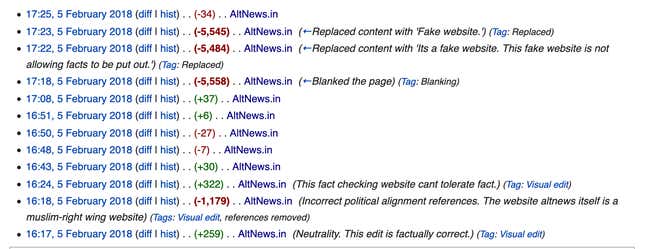Misinformation peddlers are weaponising Wikipedia amid the ongoing Indian election.
Last week, TIME magazine released a cover story critical of Indian prime minister Narendra Modi, penned by writer Aatish Taseer. Soon after, Taseer’s Wikipedia page was vandalised to falsely state that he is a public-relations manager for the Indian National Congress, the country’s leading opposition party, fact-checking website Alt News reported. The same Wikipedia user also changed the page to claim that Taseer’s latest book, about Brahmins in Varanasi, “divides Hindus.”
Screenshots of the vandalised page were pushed out by right-wing individuals on social media.
Though the edit was reverted and Taseer’s page “protected” (restricted from editing by most users) within a few hours, tweets about it remain up. As of today (May 16), a right-wing influencer’s tweet of it had been liked 1,300 times and retweeted 975 times.
There’s nothing new about politically motivated vandalism or edit wars on Wikipedia. For example, the same user who maliciously edited Taseer’s page had, six days earlier, edited a page about military operations across the India-Pakistan border, deleting a paragraph that contained information about Indian soldiers beheading Pakistani ones.
Wikipedia “has become an active source of misinformation,” said Pratik Sinha, the co-founder of Alt News. The “modus operandi” of vandals, he claimed, is to immediately take screenshots of the page with the malicious edits. This makes sure that even when the edits get reverted, the malicious content can still be circulated.
In spreading misinformation via Wikipedia, fake-news purveyors are pitching a battle against the rules and tools that the open-source encyclopedia uses to keep them in check.
Edit wars and sockpuppets
The Alt News Wikipedia page has faced vandalism many times.
In one instance, a series of changes were made last year by Aditya menon22, a user who made many disparaging or inaccurate edits about the portal. These included a line calling it a “Muslim right-wing website.” There was also an attempt to delete the entire page.

Aditya menon22 was later found to be a “sock puppet,” one of multiple accounts created to fuel a single editor’s agenda. Wikipedia’s rules strictly prohibit the use of sockpuppets.
Wikipedia has processes and tools in place for the investigation of editors suspected to be using sock puppets. A lengthy Wikipedia page contains details of the investigation into Aditya menon22 and its associated accounts, some of which also vandalised the Alt News page. The allegations were confirmed, and the users deleted.
Many sockpuppet investigations have been launched into accounts that edit India-related pages, including some involving highly controversial issues in Indian politics, like the 2002 Gujarat riots that Modi oversaw as chief minister.
Many pages on issues related to the Indian election have been subject to edit wars—when editors repeatedly override one another’s changes instead of resolving their dispute. The “talk” page of the 2019 Indian general election article, for example, contains notes from a senior editor to other editors to stop warring with one another, as well as to make sure their writing is neutrally phrased. “Your edits seem to be one-sided pro-BJP, anti-Congress,” one editor chastises another.
Some pages, including the one for the Rafale deal controversy—the largest alleged corruption scandal of this election—as well as the one for Pragya Singh Thakur, a BJP candidate accused of anti-Muslim terrorist bombings, have notes at the top saying that “The neutrality of this article is disputed.”
Guerrilla editors
Thakur’s page may be especially vulnerable to Wikipedia controversy as it was obscure until she was awarded a ticket.
“It takes time for Wikipedia to realise that ok, this topic is suddenly controversial, and we need to make sure that vandalism doesn’t occur, or people without any credentials are able to edit those pages,” Vijay Kishore Vaidyanathan, a Wikipedia editor, told Quartz. With pages that have been high-profile for longer, he said, more editors across the world keep them on their “watch” list, which gives them notifications when it has been updated. So when vandalism occurs, it is less likely to stay there for long.
This is a problem with many India-related Wikipedia pages and is especially prevalent for non-English languages ones, which have far fewer editors monitoring them, Vaidyanathan said.
“If you take a Wikipedia Hindi page, and a Wikipedia English page, you’ll see a lot of difference,” Vaidyanathan said. “For example, there is always a section about controversies in the English page, but you will see that section absent in most of these controversial figures’ Hindi pages.” For example, he pointed out, while the Hindi page for the BJP candidate is almost a verbatim translation from the English page, it is missing the part about the National Human Rights Commission’s probe that found Thakur’s allegations of police torture to be baseless.
Vaidyanathan is training to be part of the Guerrilla Skepticism on Wikipedia Project (GSoW), which fights biased editing and conspiracy theories on Wikipedia. He is one of only two Indians affiliated with the project at the moment.
GSoW is led by Susan Gerbic, a retired baby photographer based in California. When asked about the challenges that editors—especially the Indian ones—face, she spoke of a culture clash between the senior Wikipedia guard and many new people who approach editing in an aggressive way. People say, “let’s put this edit on here, we’re gonna tear this statue down, instead of writing on the talk page saying ‘this is something I think needs to be done, how can we best make this happen?’”
Wikipedia, she added, is “more important than ever,” because people are “getting their information from Wikipedia even if they don’t realise it—through the media, through bloggers, through Facebook…somebody’s reading these Wikipedia pages, getting the content off of it, and then just parroting it back.”
Read Quartz’s coverage of the 2019 Indian general election here.
